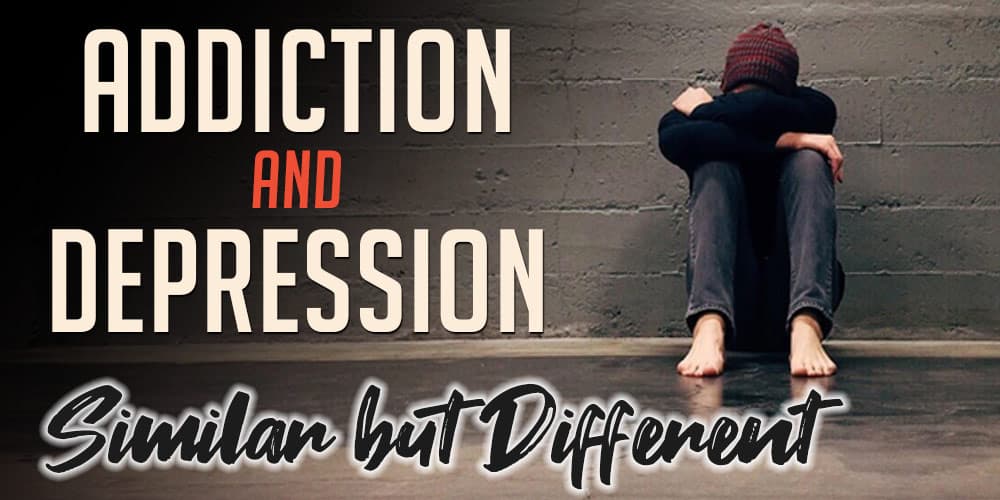
Addiction and depression, it’s much like the age-old question of the chicken and the egg. Which came first? The depression? Or the substance abuse?
Depression and addiction is a common dual diagnosis as the two disorders tend to play off one another. Those who are depressed turn to substances to numb what they are feeling, while those who suffer from addiction develop a chemical imbalance in the brain and become depressed.
Regardless of which disorder was present first, the fact is that when depression and addiction co-occur, they exacerbate each other, creating a destructive cycle that is difficult to break.
To an outsider, these disorders may look similar. It’s easy to label the symptoms of depression as a side effect of addiction and vice versa, but the truth is that while these disorders do have some similarities, they are actually quite different and require different treatment.

7 Ways Addiction and Depression are Similar
1. Addiction and Depression Affect Similar Parts of the Brain
Both depression and addiction affect the way the body responds to stress.
2. They are Both Influenced by Genetics
Depression and addiction are both known to be caused by genetic factors.
3. They Both Cause Developmental Problems
Early drug use can lead to mental health problems later in life. The reverse is also true: Early mental health problems can increase the likelihood for substance abuse in the future.
4. They are Both Isolating
Depression and substance use are disorders drive a wedge in connection and cause the person suffering to avoid social interaction. Whether the isolation is due to a disinterest in being around others or to hide substance abuse, it will only make the disorder worse.
5. They Both Feel Beyond Control
Without treatment, many who suffer from depression or addiction feel completely helpless over their disorder. When these disorders co-occur, it often feels debilitating.
6. They Negatively Impact Self Worth
Even though drugs and alcohol may temporarily numb negative feelings, substances are simply a band-aid for shame and low self-worth, which same difficult feelings caused by depression. In both disorders, many of the people suffering believe they are less valuable than others.
7. Trauma is a Factor in Both Disorders
While depression and addiction can occur in individuals who have never experienced any severe traumas, those who have experienced trauma are more likely to develop either disorder later in life.

Fundamental Differences Between Depression and Addiction
Despite all the similarities listed above, depression and addiction are fundamentally different disorders that must be treated separately.
Depression is due to an imbalance of serotonin in the brain while substance use disorders are the physical dependence on a substance such as drugs or alcohol. Because the causal factors of each disorder is so distinct, there are also distinct treatment methods for each.
In an addiction and depression dual diagnosis, while one may seem to improve with the treatment of the other, it is essential that both disorders are treated at once.
Disregarding one disorder to focus on the other will not produce long-lasting results as these disorders must both be treated simultaneously due to the effect they have on each other.
The key to treating depression and addiction is to understand the roots of these issues in order to develop the most effective treatment plan possible.
Depression is often treated with a combination of prescription medication and therapy, while substance use disorders are best treated through therapy.
Professionals specializing in dual diagnosis are the most qualified to develop treatment plans for those struggling with both depression and addiction.
Depression Awareness Month
In recognition of Depression Awareness Month, we feel it’s important to discuss the prevalence of the depression/addiction dual diagnosis and provide resources for those who are seeking help.
We have seen many people overcome this diagnosis through effective treatment and believe there is hope for anyone who is struggling.
At Alo House, we understand that recovery is not possible until the contributing factors to addiction are also treated.
This is why we offer evidence-based therapies that are effective in treating depression such as:
- Existential Psychotherapy
- Interpersonal Mindfulness Based Self-Regulation
- Neurofeedback
Our programs also include additional lifestyle activities that aid in treating depression such as:
- Meditation
- Nature immersion
- Animal assisted therapy
In everything we do, it is our mission to provide thorough treatment for our clients, giving them the greatest opportunity for a full, happy life after addiction.
Related Posts
- Overcoming Addiction Triggers - Tips for Recovery
The most difficult part of overcoming addiction and addiction triggers is making the decision to…
- 46 Movies About Drugs, Addiction and Alcoholism
Movies about drugs, addiction and alcoholism can be hard-hitting and even triggering for some people.…
- Signs Of Addiction To Watch For
Addiction is a serious disease and it is imperative for it to be regarded as…
